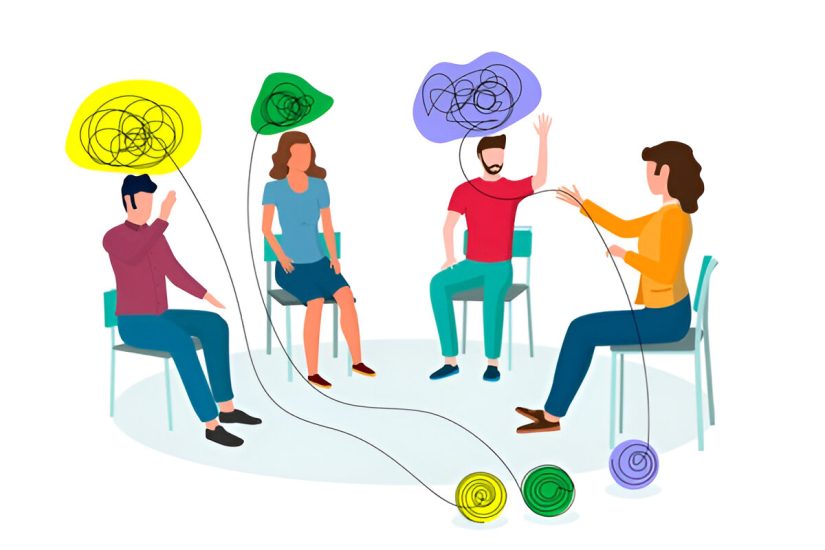- March 26, 2025
- by Harshita Bajaj
- Therapy
“There is no standard normal. Normal is subjective. There are seven billion versions of normal on this planet.” – Matt Haig
Every individual is different in how they think, behave and see the world. It is only natural to connect with like-minded people. Therapists also vary in their area of training and experience, their way of connecting with the client and many other aspects. So, finding the right therapist for you is a similar process with a few more steps, even a very qualified and experienced therapist might not be the right fit for you, as you need to assess whether they are trained in your specific needs and more importantly if you feel comfortable with their version of therapy and whether it is a right fit or not.
How to Choose a Therapist
There are a million options to choose from, specifically, over 198,811 therapists are currently practicing in the United States. Choosing a therapist can be an overwhelming process, especially when the mind may already be in a distressed state. There are many aspects to consider, such as your goals and needs, the therapist’s credentials, cost and location, timings, etc. Below is a step-by-step guide for selecting a therapist to make the process easier for you and help you in finding the right therapist.
Therapist Selection Step-by-Step Guide
Finding the right therapist is a crucial step in your mental wellness journey. Whether you’re dealing with anxiety, processing and overcoming trauma, depression, working on personal growth, knowing what to look for in a therapist can make all the difference. Here’s how you can go about it.
Determine your goals and needs
Before starting on your journey, take some time to yourself and get clarity on what you hope to achieve through therapy, what your goals are, whether you are more comfortable with an online setup or in-person sessions, your budget, and whether it is individual, couples or family therapy you are seeking.
Learn more about the role of a sex therapist here
Look at different types of therapy
There are many different therapeutic approaches, and each is suited to a specific set of needs and requirements to help a client. Some widely used therapies include:
- Cognitive Behavioral Therapy (CBT) is a relatively short-term therapy focused on negative thought patterns and behaviors. It is recommended for anxiety, depression, PTSD and eating disorders.
- Psychodynamic Therapy is a long-term therapy focused on the unconscious to understand its influence on current behavior. It is recommended for depression, anxiety, and relationship issues.
- Dialectical Behavior Therapy (DBT) combines CBT wit mindfulness and acceptance practices to help manage emotions. It is recommended for self-harm, suicidal ideation and borderline personality disorder.
- Solution-Focused Brief Therapy (SFBT) focuses on solutions and future goals rather than past problems. It is recommended for goal setting and quick problem resolution.
- Eye Movement Desensitization and Reprocessing (EMDR) is focused on processing traumatic memories through guided eye movements. It is recommended for processing trauma and PTSD.
Utilize online resources
Look at online directories and mental health platforms that allow you to search for therapists based on location, specialization and accepted insurance. For example, Psychology Today, TherapyRoute and GoodTherapy are some reputed websites that can help you find detailed profiles of therapists.
Want a therapist within your budget? Read more about how to get started with a therapist in your budget.
Credentials and licensure
Ensure that the therapist is licensed to practice in your state or country and verify their credentials and affiliations. Finding a licensed therapist can be easily verified with organizations like the American Psychological Association (APA). Usually, this information is available on a therapist’s profile.
Reviews and recommendations
Look for online reviews, testimonials from previous clients and if anybody in your network has any recommendations for a therapist to gain valuable insights and assess the effectiveness, experience and approach of the therapist.
Practical aspects
The practical aspects to consider include location of the therapist’s office, the timings and availability, fee structure and insurance acceptance and how well these aspects fit into your schedule and budget. When considering in-person sessions, location and accessibility matter a lot, for which you can search online for therapy options near me.
Questions to ask a therapist
After you have shortlisted a few options, contact them for a consultation or a preliminary conversation. Describe your issues and needs, and don’t hesitate to inquire about the therapist. Some questions to ask a therapist include:
- How long have you been practicing therapy?
- What are your areas of expertise?
- Do you have experience in treating clients with similar issues to mine?
- What therapeutic approach do you use?
- What is your availability like?
- What are the goals of therapy and how will you measure progress?
- What is your fee structure?
- What is your cancellation policy?
- What should I do if I don’t feel like we are a good fit after a few sessions?
Trust your gut
It is important to remember that therapy provides a safe space that understands you and supports you. After an initial discussion with the options, choose the one that makes you feel comfortable and trust your intuition about whether you feel safe, comfortable and understood with them or not. It might be a time taking process but if you do not feel comfortable with a therapist after a few initial sessions, that’s alright. Take your time to make a final decision if needed.
Final Thoughts
Following these steps can help you find the best therapist for you, who suits your needs and supports your mental wellness journey effectively. Seeking therapy is a courageous step and so it is important that you find the right fit that helps you achieve your goals, overcome your issues and concerns and support you in becoming a healthier version of yourself.
Finding a therapist might be difficult, but at North America Behavioral Health Services (NABHS) we help you with resources to empower you so that you take an informed first step!
Take the first step!
















